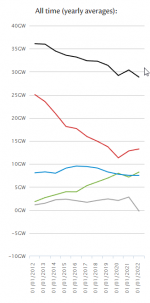Andy_W
Well-known member
Wind and Solare are not "constantly available", they actually inverse each other, to a degree, but they don't need to be largely available with the right balance of these and other sources.When I used the word constant I don't mean constant supply I mean constantly available. Supply is variable because demand is variable, when you turn on a load the generators ramp up when you turn it off they ramp down. Wind & solar are completely the opposite, the available supply ramps up & down dependent on wind speed & sun strength.
The increase in utility charges started last year long before the war in Ukraine. One of the reasons for this was there was less wind production than expected (modelled) meaning more gas had to be burnt leaving Europe's gas storage levels lower than required. This led to a rush for coal & gas which of course drove prices higher.
Weak winds worsened Europe's power crunch
Wind and solar are not cheap when you have to have other forms of generation to back them up & this will be even more the case when we phase out the current cheapest alternative of gas. Buying back up power is very expensive. National Grid spent over a billion pounds on balancing the grid last year. Not all of this can be put down to wind & solar but a fair proportion.
Do you really believe that it's "extremely unlikely" that there could be an area of high pressure sitting over Europe in the winter? I've been out in the North Sea in the middle of winter when it's like a mill pond with hardly a breath of wind. Now I'm not saying it's like that very often but if it's going to happen once you need 100% back-up. Very costly building all that plant you are only going to use every now & again.
Why bring in gas when we have a load of it beneath our land & sea?
Can you think of a reason why we have less demand? Is it because we have become so much more efficient or is it because we have shifted so much production out of the country with part of the reason being high energy costs.
They are largely available thgouh, and largely predictable seasonally, and locally more predictable a week or so in advance, and they're also high output and cheap when they are available (which is most of the time). A week should be enough time to ramp up other sources, like constantly avialible renewables, Gas, and Nuclear etc.
Yes, little wind will do that to prices to some degree, but it was also demand spiking as we came out of covid, the whole world was trying to recover from shutting down. But the previous sustained highs were nowhere what we're seeing now, and the gas was there to back it up. Previous was nowhere near the problem of what we're facing now/ have been, but the trend for the gas price is up, and wind and solar are down.
Cheaper wind and Solar cover the cost of the other backups, when they're working well the other 90% of the time. We've always had nuclear, and it's always been expensive, we pay a big price for that insurance, but we can use cheap and excess wind and solar to completely nullify these when production is high (which is a lot more common than when production is low). Like I say, even exporting it, or putting it into less efficient storage methods, until some better storage method is found (and it will be). Again, there's other more expensive renewables to provide backup, or more nuclear capacity.
The wind average for the year is around 6GW, only one-week last winter went below that (4.4GW), it didn't stop for a week, and we're not going to get high pressure sitting over us for weeks on end in the middle of winter, and even if we did we would probably be getting a small amount of solar benefit, or very mild weather, reducing demand. But like I say, we can turn the gas on, nothing saying we can't turn it on, until we have the storage sorted, we could probably cut yearly gas use by 90% in the next decade, maybe even quicker, with the levels of wind/ solar we could have (which remain profitable). If most places did that then there would be an abundance of gas available for cheap, no need to rely on Putin.
We have enough gas for ~5 days use, in storage currently, and I read we've already green-lit doubling that by next winter (adding on 50% more now I think), of course, no need to stop LNG imports either, and the exporters aren't likely to stop. We shouldn't have disposed of the storgae we already had mind, this was lunacy, we did it too early.
I suppose if we don't need to largely rely on gas then we don't need to be going looking for more it, all of the easy reserves have been tapped, only the more expensive or mort controversial (fracking) remain. It might just be cheaper to get from abroad, under normal circumstances (not now of course).
We're certainly becoming more efficient and less wasteful, it's undenable, but yes, production has gone down too, which is expected to happen as we're a developed nation, and can't compete on cost with the developing nations. We can't do anything about China growing into a massive manufacturing superhub, and loads of others will likely follow suit. We don't have the natural resources to stay being a major manufacturer, and I don't think people will be up for being paid £1 an hour. Our energy demand from the grid will continue to trend down.


